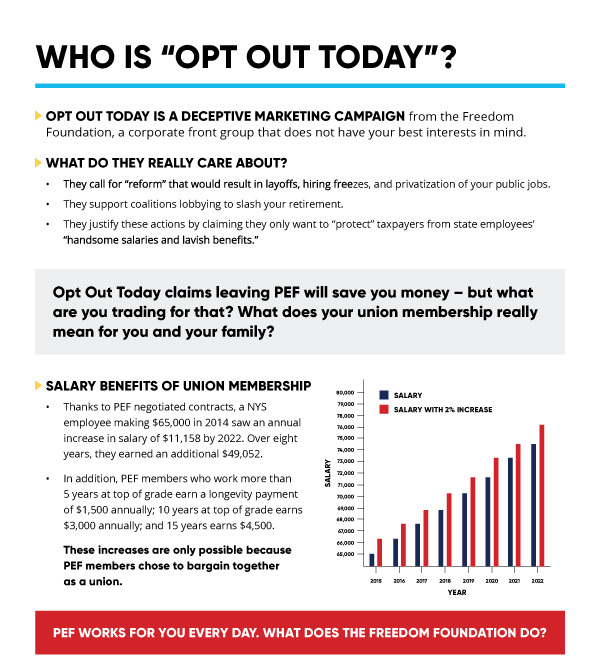June 14, 2023 — Workers across the United States are unionizing. Since March 2020 there has been a surge of workplaces that have either unionized or organized for better working conditions. In addition to well-known outfits like Amazon and Starbucks, other businesses, like Ben & Jerry’s and even some cannabis companies and grad school students, have unionized or are moving in that direction.

With that surge in labor renewal, however, anti-union forces have ramped up their attacks as well.
At Starbucks, anti-union activists are attempting to get employees to decertify their unions by offering what they call “free legal advice.” The so-called advice comes from the National Right to Work Legal Foundation, which as its name states, seeks to advance right-to-work laws in the U.S.
Anti-union forces are not always outside of government. In Florida, a new bill signed into law by Governor Ron DeSantis bans automatic dues deductions from public employees’ paychecks. If an employee wants to join a union, they will have to write a check to their union to continue paying any union dues. The bill also requires unions to recertify if the number of dues-paying members drops below 60% of eligible employees. If the employer falls below 60%, they must recertify as “bargaining agents.”
While Governor DeSantis is arguing that the bill allows for more freedom for teachers, the Florida Education Association (FEA) thinks otherwise.
“We, as educators in Florida, exercise our constitutional rights, and for doing so we have faced political retribution by the governor of this great state,” said FEA President Andrew Spar in a press release on the FEA website. “Gov. DeSantis has made it clear that he is targeting educators because we exercise our constitutional right to speak out against attempts by this governor and others to stymie the freedom to learn and to stifle freedom of thought.”
The FEA has sued the state of Florida on the grounds that the law favors unions like law enforcement and firefighters and not teachers’ unions and other public employees.
Not all states and companies are blocking efforts by workers.
In March, Michigan became the first state in almost 60 years to repeal an anti-union right-to-work law. The law, like Florida’s, affected union dues. It specifically allowed for workers in unionized workplaces to opt out of dues, creating an environment where some were enjoying union benefits without paying any dues. The law dropped union membership by nearly 20%.
Strike actions on the rise, too
This month, Gannett, the largest newspaper chain in the United States, saw its staff walk out from more than 24 newspapers, including the Democrat and Chronicle in Rochester. Gannett laid off about six percent of news division roles in December 2022. Reporters also say that their pay is so low that they are forced to seek public assistance and charity.
The NewsGuild-CWA, the union who represents Gannett journalists, places the blame for the layoffs and the lack of strategic investment in the company and in its journalists with Gannett’s CEO Mike Reed. The protest at Gannett looks to influence shareholders into a vote of no-confidence against Reed.
Here in New York, PEF continues to be a target of the Freedom Foundation, a group that is spending tens of millions of dollars to weaken unions. If you are the target of their deceptive marketing campaign, please see this document for the truth about the group and what they are trying to do.
Anti-union sentiment is not new in the U.S., but thanks to an influx of funding, the opposition has become bolder, which means that workers must fight even harder for their rights. Unions are in a tough, yet historic position to not only support their members, but show them that everything they do is in support of better pay, benefits and working conditions.
